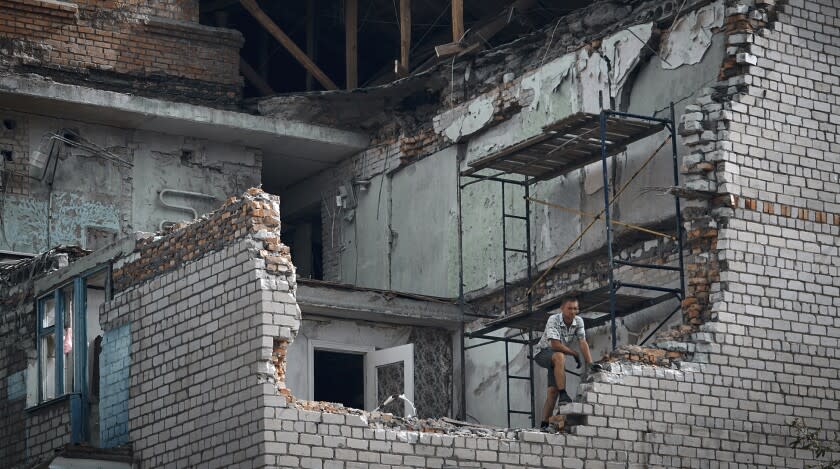More blasts in Russian-controlled Crimea shift focus of attention in Ukraine war

Explosions and fires ripped through an ammunition depot in Russian-occupied Crimea on Tuesday in the second suspected Ukrainian attack on the peninsula in slightly more than a week, forcing the evacuation of more than 3,000 people.
Russia blamed the blasts at an ammunition storage facility in Mayskoye on an “act of sabotage” without naming the perpetrators.
Separately, the Russian business newspaper Kommersant quoted residents as saying that plumes of black smoke also rose over an air base in Crimea’s Gvardeyskoye.
Ukraine stopped short of publicly claiming responsibility for any of the fires or explosions, including last week’s incident at another air base that destroyed nine Russian planes. Russia illegally seized Crimea from Ukraine in 2014 and has used it to launch attacks against Ukraine since the war began nearly six months ago.
In another reported attack, Russia’s Tass news agency quoted the FSB, the domestic security agency, as saying Ukrainian operatives blew up six high-voltage transmission towers this month in Russia’s Kursk region, close to Ukraine.
If Ukrainian forces were behind any of the explosions, that would represent a significant escalation in the war. Such attacks could also indicate that Ukrainian operatives are able to penetrate deeply into Russian-occupied territory, supplementing attempts to weaken Moscow’s forces on the front lines.
The Kremlin’s demand that Ukraine recognize Crimea as part of Russia has been one of its key conditions for ending the fighting, while Ukraine has vowed to drive Moscow’s forces from the peninsula and all other occupied Ukrainian territories.
Videos posted on social media showed thick plumes of smoke rising over raging flames in Mayskoye, and a series of explosions could be heard in the background. The Russian Defense Ministry said the fires at the depot damaged a power plant, power lines, rail tracks and some apartment buildings.
“We came out to take a look and saw clouds of smoke coming from the cow shed where the military warehouses are,” said resident Maksim Moldovskiy. “We stayed there until about 7 to 8 a.m. Everything was exploding — flashes, fragments, debris falling on us. Then the emergency guys came and said they were evacuating everybody.”
The district where the blasts happened, Dzhankoi, is in the north of the peninsula, about 30 miles from
the Russian-controlled region of Kherson in southern Ukraine. Kyiv has recently mounted a series of attacks on various sites in the region, targeting supply routes for the Russian military there and ammunition depots.
Last week’s explosions at Saki air base sent beachgoers nearby fleeing as huge flames and pillars of smoke rose over the horizon. Ukrainian officials emphasized Tuesday that Crimea — which is a popular destination for Russian tourists — would not be spared the ravages of war experienced throughout Ukraine.
Rather than a travel destination, “Crimea occupied by Russians is about warehouses explosions and high risk of death for invaders and thieves,” Ukrainian presidential advisor Mykhailo Podolyak said on Twitter, though he did not claim any Ukrainian responsibility for the blasts.
Crimea’s Russian-appointed regional leader, Sergei Aksyonov, said that two people were injured and more than 3,000 evacuated from the villages of Mayskoye and Azovskoye near Dzhankoi after the munitions depot explosions.
Because the explosions damaged rail tracks, some trains in northern Crimea were diverted to other lines.
“The detonations are rather strong. Ammunition is strewn all over the ground,” he said, adding that several homes burned down.
Russia’s military blamed last week’s blasts at the Saki base on an accidental detonation of munitions there, but it appeared to be the result of a Ukrainian attack.
Ukrainian officials at the time stopped short of publicly claiming responsibility for the explosions, while mocking Russia’s explanation that a careless smoker might have caused ammunition at the base to catch fire and blow up. Analysts also said that the explanation doesn’t make sense and that the Ukrainians could have used anti-ship missiles to strike the base.
A British Defense Ministry intelligence update said that, in the waters off Crimea, Russian Black Sea fleet surface vessels “continue to pursue an extremely defensive posture,” with boats barely venturing out of sight of the coastline.
Russia already lost its flagship, Moskva, in the Black Sea, and last month the Ukrainian military retook the strategic Snake Island outpost off Ukraine’s southwestern coast vital for guaranteeing sea lanes out of Odesa, Ukraine’s biggest port.
The Russian fleet’s “limited effectiveness undermines Russia’s overall invasion strategy,” the British intelligence update said. “This means Ukraine can divert resources to press Russian ground forces elsewhere.”
Meanwhile, in the Donbas in eastern Ukraine, which has been the primary focus of the fighting in recent months, one civilian was killed in Russian shelling and two others wounded, according to the Ukrainian governor of the Donetsk region, Pavlo Kyrylenko.
In Kharkiv, Ukraine’s second-largest city, one civilian was killed and nine others were wounded by Russian shelling, regional Gov. Oleh Sinegubov said. He added that the overnight attack on the city was among “the most massive shelling of Kharkiv in recent days.”
Officials in the central region of Dnipro also reported shelling of the Nikopol and the Kryvyi Rih districts.
Amid the explosions and shelling, one good piece of news emerged from the region, with a United Nations-chartered ship loaded with 25,350 tons of Ukrainian grain setting off for the drought-stricken Horn of Africa.
It’s the first shipment of its kind, and the U.N.’s World Food Program called it “another important milestone” in a plan to assist countries facing famine. Ukraine and Russia reached a deal with Turkey in July to restart Black Sea grain deliveries, addressing the major export disruption since Russia invaded Ukraine in February.
This story originally appeared in Los Angeles Times.


